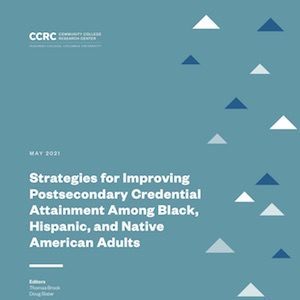 The Community College Research Center at Columbia University’s Teachers College has released a new report which includes three studies on adult education.
The Community College Research Center at Columbia University’s Teachers College has released a new report which includes three studies on adult education.
The pandemic resulted in the highest unemployment the United States has seen since the Great Depression, with particularly heavy job losses for Black, Hispanic, and Native American workers. College credentials are important for employability and higher earnings, but fewer Black, Hispanic, and Native American adults hold credentials than White adults. Community colleges can play an important role in helping those adults get back to work through certificate and degree programs that lead to better jobs. But, the report’s authors state that colleges need to pay attention to the specific needs of adult students of color as they design programs to boost workers’ skills for today’s labor market.
The authors note that community colleges have been struggling with declining enrollments among students aged 25 and over of all races and ethnicities for more than a decade, and enrollments for this age group have dropped 11 percent since the onset of COVID-19. To attract and retain Black, Hispanic, and Native American adults, community colleges need to do much better at designing, implementing, and marketing programs and services that appeal to them.
The report, commissioned by Lumina Foundation, focuses on three major areas where community colleges can improve their structures and programs:
- Aligning short-term credentials with degree programs to create smoother paths to more valuable credentials
- Improving the design and delivery of advising and other support services throughout programs
- Creating culturally sustaining instruction and supports that address the interests and needs of adults from diverse racial and ethnic backgrounds
The full 56-page report, Strategies for Improving Postsecondary Credential Attainment Among Black, Hispanic, and Native American Adults, may be downloaded here.











